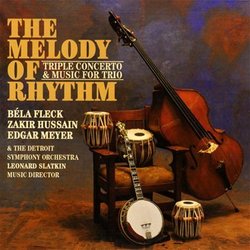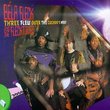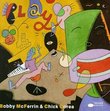| All Artists: Bela Fleck, Bela / Hussain, Zakir / Meyer, Edgar Fleck, Zakir Hussain, Edgar Meyer, Leonard Slatkin, Detroit Symphony Orchestra Title: The Melody of Rhythm Members Wishing: 2 Total Copies: 0 Label: Koch Records Original Release Date: 1/1/2009 Re-Release Date: 8/25/2009 Genres: Folk, Jazz, Special Interest, Pop, Classical Styles: Avant Garde & Free Jazz, Chamber Music Number of Discs: 1 SwapaCD Credits: 1 UPC: 099923202424 |
Search - Bela Fleck, Bela / Hussain, Zakir / Meyer, Edgar Fleck, Zakir Hussain :: The Melody of Rhythm
 | Bela Fleck, Bela / Hussain, Zakir / Meyer, Edgar Fleck, Zakir Hussain The Melody of Rhythm Genres: Folk, Jazz, Special Interest, Pop, Classical
In this era of cookie-cutter, synthetic sounds that can be generated by virtually anyone and everyone, it's almost impossible to make music that can be instantly recognized as unique and incomparable. To have that music re... more » |
Larger Image |
CD DetailsSynopsis
Album Description In this era of cookie-cutter, synthetic sounds that can be generated by virtually anyone and everyone, it's almost impossible to make music that can be instantly recognized as unique and incomparable. To have that music revealed as both groundbreaking and accessible to all is an even rarer occurrence. Banjo legend Bela Fleck, tabla genius Zakir Hussain and double-bass master Edgar Meyer, internationally-renowned virtuosi and composers, have achieved that pinnacle with this release. The centerpiece and catalyst for this album is "The Melody of Rhythm: Concerto", a gorgeously haunting, dynamic three-movement composition for banjo, double bass and tabla. Recorded live with the Detroit Symphony Orchestra and conducted by Leonard Slatkin, the highly rhythmic work soars, melding Indian classical rhythms with American roots-derived melodies and big-sky orchestral horizons. The remaining trio pieces further explore a group dynamic that promises to gain in richness and nuance as they continue their travels throughout the world. Fleck and Meyer have been collaborating for over 25 years, inclduing the Grammy-winning "Perpetual Motion" and the classic "Appalachian Journey" with Yo Yo Ma. Fellow Grammy winner Zakir Hussain is generally acknowledged to be the world's greatest virtuoso of the tabla drums, renowned for his cross-genre work with the likes of John McLaughlin's Shakti, Mickey Hart's Planet Drum, and Yo To Ma's Silk Road Project. For all three of these explorers, an understanding of musical tradition and improvisation has led them to this common crossroads, or as Bela Fleck described it in a recent Downbeat cover story, "getting together with some brothers he hadn't seen in some time". Similarly Requested CDs
|
CD ReviewsIndescribably Delicious Constant Listener | New Jersey | 08/26/2009 (4 out of 5 stars) "There's really no way to accurately describe this music. Is it World Music because the great Zakir Hussain is on it? Americana or Classical because of Edgar Meyer? Bluegrass or Jazz because Bela Fleck rounds out the group? You can put aside all of these categories because the music is all of it and more, and completely accessible. It's not a hodgepodge of styles. The compositions and sounds have real unity and the players enjoy legitimate chemistry. It's absolutely not avant garde or free jazz, and I have no idea why Amazon has it in this category. Classical is more appropriate but doesn't tell the whole story. The recorded sound is less austere than your average ECM production, but I think if you like the cross-cultural music from that great label, you'll be on board. Obviously, fans of any or all three of the principals (as I am) are sure to love it." No Mere Stylistic Mash-up Kyle G. in DC | Washington, DC | 09/26/2009 (5 out of 5 stars) "Last Sunday the Honolulu Orchestra presented their only new-music offering of the season: a live version of the work before you, Edgar Meyer's The Melody of Rhythm. This triple concerto for banjo, bass, and tabla was first recorded by the Detroit Symphony Orchestra, and I absolutely can't recommend it highly enough. Performers Béla Fleck, Edgar Meyer, and Zakir Hussain are simply amazing musicians and collaborators. So much could go wrong combining these three distinct genres, leading to a confused and watered down presentation of each. But this is no mere stylistic mash-up. In the hands of these brilliant performers, Meyer's work forges a memorable and convincing amalgam that fully realizes the potential of collaborative music. Here is a taste of the concerto only (3 of the 9 tracks): Fleck's solo banjo, echoed by flutes and xylophone, unfolds a frenetic and monophonic opening theme. This unconventional doubling sets the stage nicely for the coming array of orchestral colors and doublings, and is proceeded by the first entrance of all three soloists. A warm, slowly undulating orchestral texture with high sustaining strings provides a nice interlude before the entrance of a cantabile and memorable folksy melody. As the movement progresses, material returns with added contrapuntal interest. A walking bass line supports a frenetic banjo line. The winds enjoy a rare spotlight through their counter-melodies. Three-part orchestral lines intertwine then mingle with a richer chordal texture. Although all three soloists benefit from solos in this movement, the most attention is given to the tabla. Perhaps Meyer wanted to establish early on that the foreign tabla has a rightful place in this orchestral context. Hussain's rhythmic mastery and sensitivity to vocal inflection leaves no doubt about that. His first extended solo shows off the remarkable melodic range of the instrument as well as strokes so inhumanly rapid they approach definite pitches. With just under one minute remaining, the folk melody returns high in the bass register with the other soloists accompanying. The movement is framed nicely by a succinct return of the quick banjo line coupled with flute and xylophone, effectively preparing the listener for the more subdued character of the slow movement. The captivating second movement begins plaintively with ascending perfect 5ths in the brass that interlock to form some pleasing dissonances. This spare introduction builds then gives way to one of many soulful strains of a high bass solo. A flowing triple meter prevails.Remarkable color is achieved through a banjo melody doubled by low flutes, and the cellos chime in with quick duple figures. The banjo, bass, and tabla at last combine in a tight melodic and rhythmic unison before this first tension is released. After a hint of the introductory 5ths, Fleck's lovely solo work returns, including a hypnotic two-against-three solo figure that is simply arresting. Finally, a true return to the opening brass lines is begun then quickly interrupted by the full orchestra. A brief solo trumpet line sustains over final, subdued orchestra chords, leaving a complex sense of repose in its wake that lingers nicely in concert. (The CD really needs more time between tracks.) The final movement takes advantage of the widest range of influences. Beyond the previous Indian and U.S. folk strains, we also hear Debussian harmonic planing, jazz-like solo trade-offs, and "full stop" string and brass chords reminiscent of Stravinsky and Copland. Meyer has saved the strongest orchestral presence and solo passages for last. A charming, melody-driven groove develops gradually, drawing on asymmetrical metric patterns. Using this visceral momentum, the soloists really take off. Meyer saws away at yet another soaring solo with unbelievable technical flourishes. The banjo and tabla pick up the action in rhythmic and pitch-relative unison, truly highlighting the melodic capabilities of this percussion instrument. The movement's final section begins with a complexity approaching free jazz: all three burst out in a cacophony of independent, simultaneous soloing. They make their way back to a unison statement, then trade off phrases like a jazz trio, cementing their impressive abilities for unity of gesture and color. The tumult of the orchestra returns followed by a brief yet definitive ending statement. Expect great things from this album and from the future output of these three phenomenal artists. If you haven't already, do yourself the favor of purchasing either the MP3 album or the hard copy CD, and give it a listen. For your trouble, you'll also get six additional tracks comprising 36 minutes of equally sophisticated and fun music by the same artists. It's well worth the time and money, if you ask me, and is among the best releases of the year in any genre." Inclusive Yet Unique: Classical World Jazz Fusion Dr. Debra Jan Bibel | Oakland, CA USA | 09/14/2009 (5 out of 5 stars) "Imagine in an alternate universe the avant-garde jazz group Oregon was a trio, with Ralph Towner playing banjo instead of guitar, tablist Collin Walcott was still alive, and Glen Moore played bass. What sort of sound would that be? In our own realm, we have three brilliant musical masters, Bela Fleck, Edgar Meyer, and Zakir Hussain, who explore such a combination of timbre with some trio improvisations that are unique, neither bluegrass, nor jazz, nor classical, nor Indian, though a tinge of all may be discerned. Moreover, as the quartet Oregon played with the Moscow Tchaikovsky Symphony Orchestra, the trio is heard on this album with the Detroit Symphony Orchestra conducted by Leonard Slatkin. These particular tracks consist of a scored, truly classical triple concerto, The Melody of Rhythm, which was first performed with Slatkin and the Nashville Orchestra. It is dandy piece, with the soloists performing some bright flourishes, though the concerto structure is largely a scaffolding. The second movement particularly and to some extent the third have a strong flavor of a North Indian raga. It is a piece scored by a committee and it shows; but I enjoy the experiment. The beginning and concluding trio pieces are interesting chamber studies. Everything about this trio is novel. Stretch your ears with this album, which defies categorization."
|

 Track Listings (9) - Disc #1
Track Listings (9) - Disc #1








